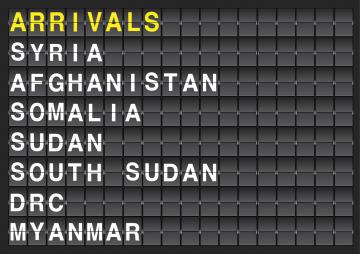4 fundamental rights issues to consider in EU safe countries list

Access FRA Opinion concerning an EU common list of safe countries of origin >>
“An EU safe countries of origin list can assist the EU confront the migrant crisis, as long as it is compliant with fundamental rights. It is essential that any migrant facing involuntary return has the opportunity, on the basis of his/her personal circumstances, to challenge any assumption of safety,” said FRA Director, Michael O’Flaherty. “From a fundamental rights point of view, the existence of a list of safe countries of origin is legitimate, however, it must be constructed and applied respecting fundamental rights. Above all, it must be administered in a manner that non-negotiably honours the right to asylum.”
Safe countries of origin are the asylum seekers’ countries of nationality where there is no risk of persecution. Member States compile lists of these countries to help fast track asylum applications. However, they differ widely in which countries are included in national lists. Their approaches to handling asylum applications from these countries also varies. This has partly led to a European Commission proposal to establish an EU common list of safe countries of origin which the European Parliament asked FRA to comment on.
FRA’s Opinion concerning an EU common list of safe countries of origin looks at the fundamental rights impact of the proposal. It finds that such a list should only be viewed in the wider context of overall EU asylum laws and responsibilities, and how they are being implemented in the Member States. However, it should not be the only tool to speed up asylum processing; more financial and human resources, as well as training, enhanced coordination between agencies etc. should be deployed to ensure individual assessments are still carried out.
If such a list was established it could fast track asylum applications which are unfounded. This could free up existing scarce resources to focus on dealing with bona fide claims, shorten processing times and make more space available at reception centres. However, the fundamental rights of all asylum seekers would need to be maintained and protected. These include:
- The right to asylum, non-refoulement and preventing collective expulsion: Without exception, no one should ever be returned to a country where they risk being persecuted. This principle of non-refoulement, guaranteed by EU and international law, means that every asylum seeker from safe countries has the right to be heard, and should be given ample opportunity and assistance to present their asylum case. Member States should also ensure there are adequate safeguards against collective expulsions. The EU list must also build in flexibility for change to remove unsafe countries or to reflect worsening circumstances in these countries. Such assessments must be based on comprehensive sources.
- The right to an effective remedy: All asylum seekers have the right to appeal decisions. If they come from a country on a safe list, they should still be allowed to stay in Member State during the appeal procedure. They should also have proper access to information and legal assistance, especially since the burden of proof for them is greater as they need to disprove any presumption of safety.
- Child rights: Unaccompanied asylum-seeking children from listed safe countries should not have their claims assessed too fast. This does not give enough time for the child’s best interests, a legal requirement under EU and international law, to be assessed. In addition, while claims for safe countries are being processed at border points, children should not be arbitrarily detained.
- The right to non-discrimination: While all people in similar situations should be treated equally, when it comes to generalised safe lists, care needs to be taken to ensure minority groups are not put at risk. Such groups may be at greater risk of persecution if returned than the general population.
FRA’s assessment serves to highlight potential areas of concern when establishing an EU common list of safe countries of origin. The opinions are meant to feed into the European Parliament’s own assessment of the Commission’s proposal.